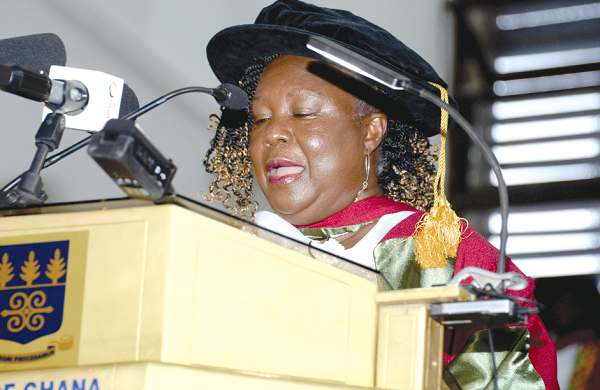
Improve environment for media practice - Prof. Gadzekpo urges stakeholders
A former Dean of the School of Information and Communication Studies of the University of Ghana, Professor Audrey Gadzekpo, has called for an improvement in the environment in which the media operate irrespective of the laws in place.
She said journalists must feel safe and confident to do their job without fear of attacks, adding that "whether state or non-state actors, those who violate media rights ought to be held accountable and sanctioned" as it is the only way to reduce impunity.
Advertisement
She, however, charged the media to do an introspection to address the litany of complaints against them.
"Without space for civic freedoms, there is the risk that authoritarian governments would place further restrictions to deal with the media's ability to hold them accountable," Prof. Gadzekpo said in her inaugural lecture held at the Great Hall of the University of Ghana(UG), Legon, last Thursday.
It was on the topic: "Taking the Gown to Town: Reflections of a Scholar-Activist on Media in Ghana's Democratic Journey".
The event
The lecture was the third in a series of inaugural lectures for the academic year and the first to be organised by the University of Ghana in recognition of the achievements of a female scholar since the first female Vice-Chancellor, Prof Nana Aba Appiah Amfo, assumed office.
The event was attended by some past Vice-Chancellors of the University of Ghana, members of academia, media regulators, civil society organisations and a other personalities.
In the view of Prof Gadzekpo, if the media are to be guardians of democracy, "they themselves must deepen their commitment to democratic ideals. Media development organisations, media activists and scholars must consciously seek to engage those in the media for owners to have reporters who develop stronger understanding of why the media must work in the public interest in support of democratic development."

She explained that although there had been many attempts by organisations within and outside academia to build the capacity of media practitioners, the media industry itself must invest more in building the capacity of their employees.
"There are few investigative journalists in Ghana for example, and most media organisations are unwilling to allocate resources for investigative journalism or sustained coverage of issues.
"Capacity building must also include skills to cover specialised topics like the environment, science and technology which affect people," she said, and emphasised that "the trainings must also aim at helping to build a more equitable society by addressing media content and encouraging the media to enhance coverage of the marginalised and socially excluded."
Professionalism
Prof Gadzekpo further indicated that efforts to improve professional media and standard ethics must also be strengthened in order to ward off hostile external regulations.
That, she said meant that media companies and associations such as the Ghana Journalists Association and the Ghana Independent Broadcasters Association, must encourage self regulation and hold their employees and members more accountable when they contravened professional and ethical laws.
Prof Gadzekpo said with media businesses already under strain, they must look for new models and find more innovative ways to survive.
She noted that the Ghanaian media were not alone in such predicament and that the "old model where commercial advertising is the only source of media funding is amplifying. Other sustainable types of funding from private philanthropists to public subsidy must be explored," she suggested.
She said since the media were for public good, it must be supported to survive.
"If for nothing else, they must survive in the interest of democracy," she emphasised.
Lecture
Prof. Amfo, who chaired the event and introduced Prof Gadzekpo to the audience earlier, said “ this is another feather in the cap of our female scholars and we are so proud of this accomplishment.”
Prof. Amfo explained that the university periodically organised the inaugural lectures in recognition of contributions of academics on their promotion to the rank of Professor and also serves as a platform for “our new professorial colleagues to share some insights into their innovative research works over the years".



